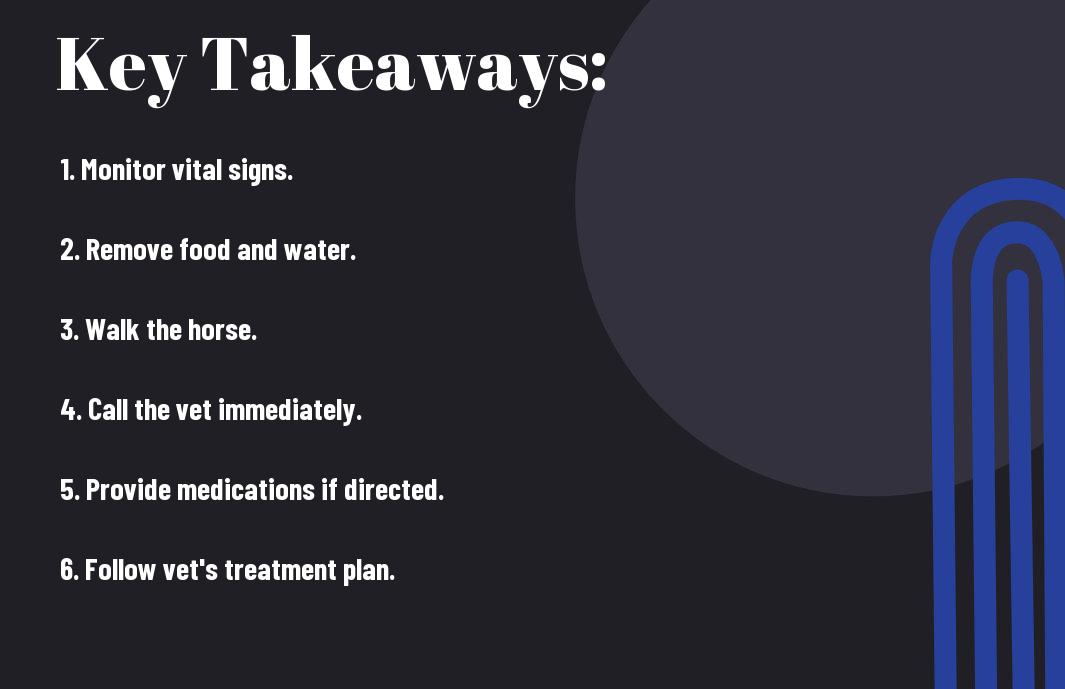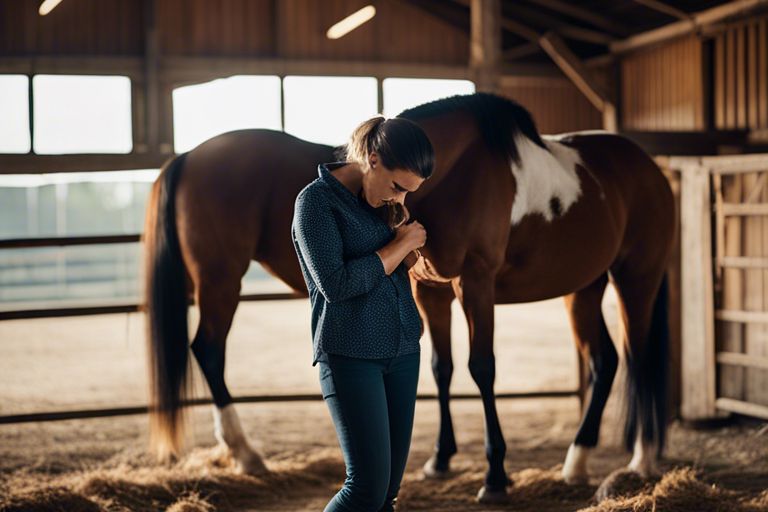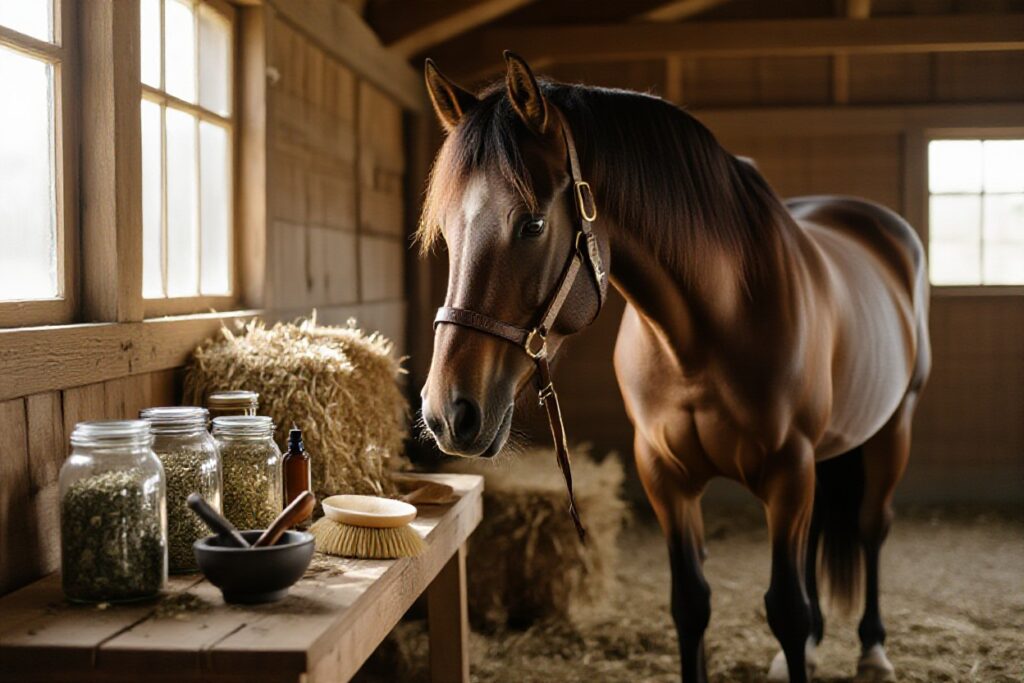Just imagine the worry and stress that can come with realizing your horse is colicky. In this informative guide, you will learn the necessary steps to take when your horse is experiencing colic. From assessing the situation to contacting your veterinarian, you will be equipped with the knowledge to provide the best care for your beloved equine companion. Stay calm, stay informed, and most importantly, stay prepared for when colic strikes.


Recognizing the Signs of Colic
A colicky horse can be a pet owner’s worst nightmare. The key to helping your horse through this condition is early recognition of the signs. Here are some vital signs to look out for:
Common Symptoms
On any given day, your horse might display mild signs of discomfort like looking at its belly or lying down more often. However, if you notice excessive pawing, rolling, or sweating, these could be signs of colic. Additionally, keep an eye out for loss of appetite, elevated heart rate, or lack of manure production, as these are also common symptoms of colic.
Behavioral Changes
Behavioral changes are also important indicators of colic in horses. If you observe your horse being restless, agitated, or repeatedly lying down and getting up, it’s crucial to take action. Another important behavioral sign is if your horse is curling its lip or looking at its flank, as these actions could signal discomfort.
Behavioral changes in colicky horses can be subtle, so it’s necessary to pay close attention to your horse’s normal behavior to identify any unusual patterns that could indicate an underlying issue.
Another sign to watch for is repeatedly getting up and down, especially if done violently or excessively. This behavior can indicate severe pain and distress in your horse, requiring immediate veterinary attention.

Initial Response and Assessment
Stay Calm and Act Quickly
Any sudden change in your horse’s behavior can be alarming, especially if you suspect colic. Remember to stay calm and act quickly. Panicking will only increase stress for both you and your horse. Take a deep breath, and focus on assessing the situation. Your quick actions can make a significant difference in your horse’s recovery.
Observe Your Horse’s Behavior
Calmly observe your horse’s behavior to gather important information for your vet. Look for signs of distress such as pawing, rolling, sweating, kicking at their belly, or repeatedly lying down and getting up. These behaviors indicate potential colic. Another crucial sign to watch for is if your horse is grinding its teeth, a possible indicator of pain.
Monitoring your horse’s behavior closely can help your vet assess the severity of the colic and determine the appropriate course of action.
Check Vital Signs
Observe your horse’s vital signs, including their heart rate, respiratory rate, and gum color. A fast heart rate, rapid breathing, or pale gums can all signal a serious issue that requires immediate veterinary attention. Knowing your horse’s normal vital sign ranges ahead of time can help you quickly identify abnormalities in an emergency.
Assessment: It is crucial to promptly check your horse’s vital signs and behavior when colic is suspected. Keep in mind, any abnormal vital signs or signs of severe distress warrant immediate veterinary intervention. Pay close attention to your horse’s behavior, as it provides valuable clues to the severity of the colic episode.
Providing Immediate Care
Once again, dealing with a colicky horse can be a stressful situation, but providing immediate care is crucial to help your horse through this challenging time. There are several actions you can take to assist your horse while waiting for the vet to arrive.
Withholding Food and Water
Withholding food and water is imperative when your horse is showing signs of colic. This is because feeding your horse could exacerbate the condition or lead to complications if surgery is required. It’s crucial to prevent your horse from ingesting anything until the vet can assess the situation and recommend the appropriate course of action.
Administering Pain Relief
For administering pain relief, it is best to wait for your vet’s guidance. They will be able to prescribe the appropriate medication based on the severity of the colic episode. Pain relief should only be given under the supervision of a veterinarian, as some medications can mask symptoms and make diagnosis more challenging.
Immediate pain relief can help your horse feel more comfortable and may assist in relaxing their gut, potentially aiding in resolving a mild colic episode.
Applying Heat or Cold Therapy
The application of heat or cold therapy can sometimes help with relieving pain and discomfort associated with colic. Placing a warm compress on the abdominal area or using a cooling gel can provide some relief. However, it is imperative to consult with your vet before attempting any type of therapy to ensure it is safe and appropriate for your horse’s condition.
With the guidance of your vet, you can determine whether applying heat or cold therapy is suitable for your horse and how it can be done effectively to alleviate their discomfort.

Identifying the Cause of Colic
Many factors can contribute to colic in horses, making it crucial to identify the root cause promptly. Gastrointestinal issues are a common culprit, ranging from intestinal blockages to twists in the gut. An understanding of equine anatomy will help you recognize the signs of such problems, such as excessive pawing, rolling, and signs of discomfort.
Gastrointestinal Issues
An evaluation by a veterinarian can help determine if your horse is suffering from a gastrointestinal issue. Conditions like impaction colic or displacement of the intestines require immediate medical attention to prevent further complications. It’s imperative to act swiftly and decisively if your horse is showing symptoms of gastrointestinal distress.
Dietary Factors
To prevent colic caused by dietary factors, ensure your horse has a balanced diet with adequate roughage and water intake. Avoid sudden changes in feed or overfeeding, as these can disrupt the delicate balance of your horse’s digestive system. Monitor your horse’s hydration levels and ensure access to clean water at all times, especially during hot weather. After all, prevention is key when it comes to dietary-related colic.
Environmental Triggers
Triggers such as stress, changes in routine, or exposure to moldy or dusty environments can also lead to colic in horses. Keep your horse on a consistent schedule and provide a clean, well-ventilated living environment to reduce the risk of environmental-related colic. Pay attention to any changes in behavior or living conditions that could potentially trigger an episode of colic.
Dietary adjustments and environmental management are crucial in preventing colic episodes in your horse. By maintaining a healthy diet and a conducive living environment, you can significantly reduce the risk of colic and ensure the well-being of your beloved equine companion.
When to Seek Professional Help
After trying initial steps to relieve your horse’s colic, it’s necessary to know when to seek professional help. If you notice signs of severe colic, do not delay in contacting your veterinarian.
Signs of Severe Colic
Help your horse by recognizing severe colic symptoms such as violent rolling, thrashing, sweating, or extreme distress. Other concerning signs include a rapid pulse, pale gums, or cold extremities. If you observe any of these symptoms, do not hesitate to call your vet immediately.
Consulting Your Veterinarian
Professional guidance is crucial when dealing with a colicky horse. Your veterinarian will perform a thorough examination to diagnose the severity of the colic and recommend the best course of action. Additionally, they may suggest further diagnostic tests such as blood work or abdominal ultrasound to assess the situation accurately.
Preparing for a Veterinary Visit
When contacting your vet, be prepared to provide important details about your horse’s condition. Before the vet arrives, you can prepare for the veterinary visit by noting your horse’s vital signs, any recent changes in diet or environment, and the timeline of when the colic symptoms started. This information will assist the vet in making a quick and accurate assessment.
The prompt veterinary intervention is necessary in cases of colic, as delays can lead to serious complications or even be life-threatening. Have a designated area ready for the vet to examine the horse, with good lighting and a flat surface for assessments.
Ongoing Care and Prevention
Dietary Changes
One important aspect of ongoing care for a horse that has experienced colic is making dietary changes. Your veterinarian may recommend adjustments to your horse’s diet, such as increasing roughage, offering smaller and more frequent meals, or changing the type of feed. It’s imperative to follow these recommendations closely to prevent future episodes of colic.
Managing Stress and Anxiety
Ongoing care for a horse prone to colic also involves managing stress and anxiety. Stress can contribute to colic episodes, so it’s crucial to provide a calm and consistent environment for your horse. Increase turnout time, ensure social interaction with other horses, and maintain a regular routine to help reduce stress levels.
This focused attention on your horse’s mental well-being can be as vital as their physical health when it comes to preventing colic. A relaxed and content horse is less likely to experience digestive disturbances that can lead to colic episodes.
Regular Veterinary Check-Ups
Veterinary monitoring through regular check-ups is key to preventing colic and addressing any underlying issues promptly. Your vet can perform routine examinations, assess your horse’s overall health, and provide guidance on preventive measures. They may also recommend specific dietary supplements or medications to help support your horse’s digestive system.
To ensure your horse’s ongoing well-being, schedule regular check-ups with your vet and follow their recommendations diligently. By staying proactive and attentive to your horse’s health, you can reduce the risk of colic and other health concerns.
Conclusion
With this in mind, it’s crucial to always be prepared for a colic emergency with your horse. By knowing the signs, having a plan, and taking quick action, you can increase the chances of a positive outcome. Remember that early detection and intervention are key in treating colic successfully.
By following the steps outlined in this article and seeking veterinary assistance when needed, you can be better equipped to handle a colicky horse. Your prompt and calm response could make all the difference in your horse’s recovery. Do not forget, staying informed and prepared is the first line of defense in keeping your equine companion healthy and happy.
Q: What are the common signs of colic in horses?
A: Common signs of colic in horses include pawing, looking at their sides, rolling excessively, sweating, elevated heart rate, loss of appetite, and absence of gut sounds.
Q: What should I do if I suspect my horse is colicky?
A: If you suspect your horse is colicky, contact your veterinarian immediately. Do not wait to see if the symptoms improve on their own, as colic can be life-threatening.
Q: Can I give my horse medication for colic before the vet arrives?
A: It is not recommended to give your horse any medication for colic before the vet arrives. Some medications can mask symptoms and make it harder for the vet to accurately diagnose the issue.
Q: Should I walk my horse if they are colicky?
A: Walking a colicky horse can be beneficial in some cases, as movement can help alleviate gas and encourage gut motility. However, always follow your vet’s advice as walking may not be suitable for all types of colic.
Q: How can I prevent colic in my horse?
A: To help prevent colic in your horse, ensure they have a consistent feeding routine, access to clean water at all times, regular dental check-ups, regular exercise, and a balanced diet with plenty of forage. Minimize sudden changes in feed or routine to reduce the risk of colic.










